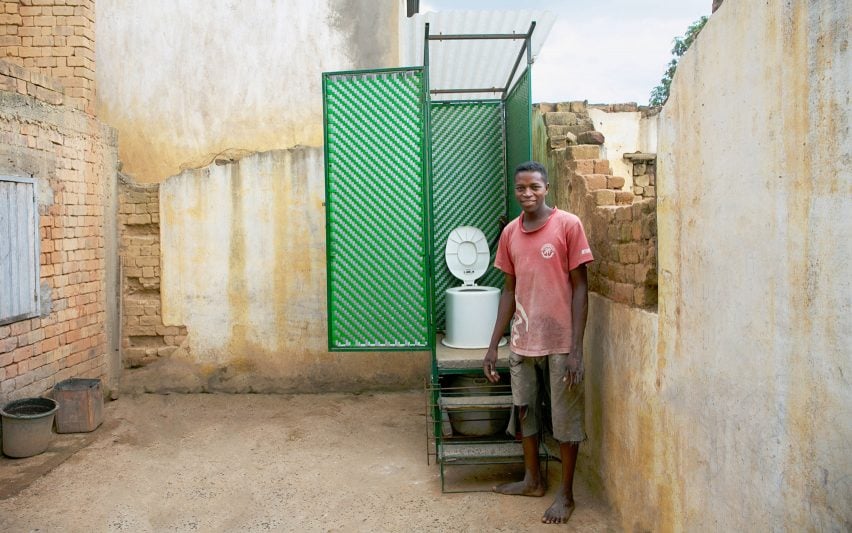LooWatt is a toilet that can be flushed without the need for any water, safely disposing of human waste to be turned into electricity and fertiliser.
The LooWatt system offers a safe and sustainable alternative to off-grid toilets such as chemical flushing loos at outdoor festivals, or pit latrines. By using waste sustainably to create power it forms part of the circular economy, which aims to eliminate waste and pollution from the global economy while restoring natural systems.
LooWatt is currently on display at the V&A museum in London as part of its latest exhibition Food: Bigger than the Plate, which looks at the future of food.
"We believe that to make a new solution for sanitation in the 21st century, you need to have the experience on a par with a flush toilet in terms of hygiene and no odour," LooWatt inventor and founder Virginia Gardiner told Dezeen.
"You need to have a waterless system so that you don't need to waste water to get human waste out of sight and out of mind. And you need to have value generating systems."
Waste is captured and sealed in a biodegradable polymer film, which forms an airlock to safely contains disease and odour. This is collected and taken to a specialised anaerobic digester, which produces biogas, fertiliser and electricity, which can then be sold to generate revenue.
LooWatt partners with local waste disposal services to implement this final stage of the process.
The system is designed to run without water, which is is an increasingly precious resource, particularly in the global south.
The UN estimates that by 2030, according to current climate change scenario models, half of the world's population will be living in water-stressed areas.
Diseases caused by poor sanitation cause two million deaths globally per year according to the World Health Organisation, something LooWatt hopes to change.
LooWatt can be fitted to a standard toilet pedestal, although it is currently developing its own, more compact, model.
Currently 800 people around the world use LooWatt toilets including in the UK, where the company is working with Thames Water to dispose of the sealed film end-product. LooWatt is funded by InnovateUK and the Bill & Melinda Gates Foundation.
"We're shipping several hundred toilets to Madagascar this year, as well as the Philippines, where we have a utility partnership with the water utility that's doing a large-scale rollout of non sewer toilets, " said Gardiner.
"Non sewer-serviced toilets are the future for urban sanitation in many parts of the world. It's the future, but it's also happening right now."
Making safe and sustain toilets for remote or dangerous areas poses a unique challenge for designers.
Architecture studio Spark has developed a concept for a 3D-printer composting toilet that could generate electricity for remote villages in India, and designer Anna Meddaugh created a portable and reusable toilet for women living in refugee camps.
Images courtesy of LooWatt.

